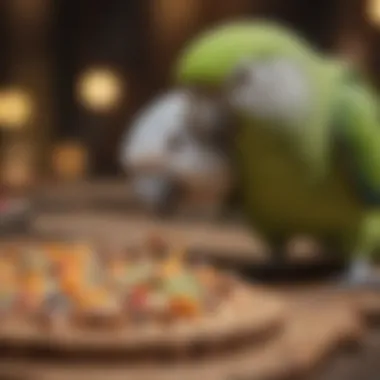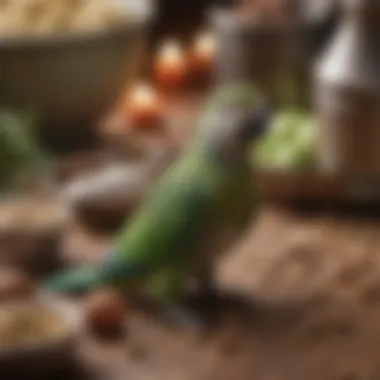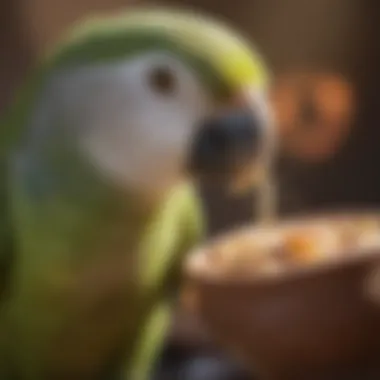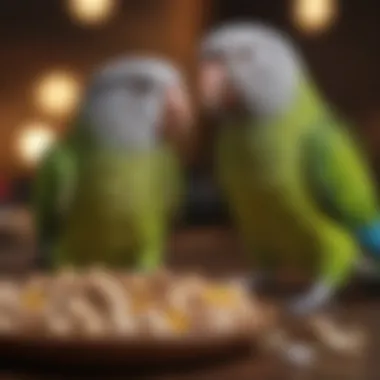Quaker Parrot Treats: Nutrition, Care & Benefits Guide


Intro
Quaker parrots, also known as monk parakeets, are engaging and social birds that require specific care to thrive. An important aspect of their well-being is proper nutrition, which includes not only their main diet but also treats. Treats can provide enrichment but have to be given thoughtfully to meet their dietary needs without causing health issues. Therefore, understanding what treats are appropriate for Quaker parrots is crucial for pet owners.
This guide aims to delve into the diets of Quaker parrots, detailing suitable treat options, their nutritional value, and practical advice on preparation. Furthermore, it addresses the balance required in offering these alternatives to prevent any detrimental effects on health. With the focus on enhancing your bird's quality of life, we emphasize making informed decisions about their dietary choices. By investigating certified information and practical approaches, we hope to empower you, as bird owners, to create a balanced regimen for your Quaker parrot.
Care Tips
Daily Care Routines
Establishing consistent daily routines is fundamental for Quaker parrots. These routines can help foster trust and create a stable environment. Basic daily tasks include feeding, cleaning the cage, and engaging with your birds through social interaction. Take note of your bird’s reaction to food and interaction; this helps you differentiate between its likes and dislikes, ensuring a richer, healthier environment.
Cage Setup and Maintenance
The setup of the cage is critical for a Quaker parrot's security and happiness. It should be spacious enough for stretching wings and climbing around. Use non-toxic furnishings including perches of varying diameters, swings, and stimulating toys. Regularly check all parts to rid any safety hazards that may arise.
Hygiene and Cleaning Practices
Hygiene plays a vital role in your bird's health. Daily cleaning of food bowls and weekly comprehensive cleanings with safe products will keep bacteria at bay. Pay attention to the corners and crevices of the cage, as debris can accumulate there, leading to health issues.
Seasonal Care Adjustments
Different seasons present unique challenges and adjustments may be necessary. In colder months, extra warmth and barrier against drafts are vital. Meanwhile, in warmer seasons, sufficient hydration and avoiding overheating through shade or air circulation are key. Monitoring your bird's condition and behavior can guide you in these adjustments.
Behavioral Insights
Understanding Bird Body Language
Recognizing your Quaker parrot's body language can offer valuable insight into its emotional health. Signs of discontent, hello or other vocalizations may appear when companionship is sought or stress is present. Learning these signals will help you manage your bird's anxiety and strengthen your own bond.
Common Behavioral Issues and Solutions
Behavioral issues in Quaker parrots may include screaming, biting, or feather plucking. These behaviors often stem from boredom, lack of interaction, or changes in the environment. Simple strategies include providing varied toys, scheduled playtime, and maintaining a consistent routine.
Positive Reinforcement Techniques
Offering treats strategically follows positive reinforcement. When your Quaker parrot performs a desired action, promptly reward it with a treat. This fosters learning and adapts behavior positively when boundaries are respected.
Social Interaction Needs
Quaker parrots thrive on social interaction, both with their owners and other birds. Ensuring they have adequate social engagement is vital in curbing loneliness and destructive behaviors. Set aside dedicated time each day for bonding.
Nutrition Guides
Essential Diet Components
Core components of a Quaker parrot’s diet should include high-quality pellets, fresh fruits and vegetables. Always ensure foods are safe and non-toxic. Leafy greens such as kale or finely chopped peppers will offer essential vitamins.
Safe and Toxic Foods
While providing treats, always be aware of safe and dangerous choices. Safe foods include apples, bananas, or cooked sweet potatoes. Certain items, such as chocolate, caffeine, and avocado, pose significant harm and must be avoided.
Supplements and Treats
In addition to basic diets, supplements can be beneficial. Calcium and multivitamins can address deficiencies. Most importantly, ensure that treats are typically low in fat and offered sparingly.
Feeding Strategies for Different Species
Different species may require adjusted feeding strategies. Quaker parrots have energetic lifestyles and its requirements will change based on activity levels or age. Observe weight management and adjust feeding accordingly.
Wellness and Health


Routine Health Checkups
Scheduling routine veterinary checkups can preemptively catch health-related problems. Finding a vet experienced with avian care is crucial. Regular visits contribute positively to your bird's longevity.
Identifying Symptoms of Illness
Recognizing subtle signs of illness can save lives. Symptoms such as changes in droppings, lack of energy, or disinterest in engaging indicate potential health problems. Consult a veterinarian if you notice concerning behaviors.
Preventative Care and Vaccinations
Ensure to keep the vaccination chart updated. Preventative measures allow for better health management and stopping others from becoming sick. This is an intuitive approach to healthcare for your pet.
Mental and Emotional Well-being
Mental health is essential for Quaker parrots. Providing ample stimulation, social interaction, and the right environment fosters a healthier emotional state. Regular handling and encouraging exploration grants them a fulfilling lifestyle.
Enriching Activities
Toys and Playtime Ideas
Invest in a variety of toys which can engage a Quaker parrot's active mind. Climbing surfaces, puzzles, and chewable materials contribute to mental engagement. Regular rotation of toys can keep their play excitement renewed.
Training and Tricks
Teaching your Quaker parrot tricks can solidify bonds and offer mental stimulation. Start with simple commands, rewarding with treats as positive reinforcement.
Outdoor Activities and Interaction
Allowing your parrot safe outdoor time can offer exploratory opportunities that enhance its physical behavior. Always supervise and provide idependant enclosed inside areas.
DIY Projects for Mental Stimulation
Consider creative DIY toy projects that allow your bird to inventively engage. Items such as cardboard boxes or shredded paper can create great temporary play scenarios.
In essence, providing well-rounded nutrition and enriched surroundings sustains not only physical but mental approximative care as well. Treat-quality, consistency of dedication, interaction can fill the Quaker parrot’s life beat with joy and vigor.
Understanding Quaker Parrots
Understanding popular facts about Quaker parrots is vital for pet owners. Their unique behaviors and preferences significantly impact their health. Recognizing these traits allows for tailored care, surpassing basic ownership. Knowing about them means better decisions about diet and the type of treats to offer. Only when owners are educated about whom they care for can they work towards a happier, healthier bird.
Characteristics of Quaker Parrots
Quaker parrots, or Monk parakeets as they are also known, possess distinct features making them fascinating pets. Usually, they have green plumage with lighter underparts. Their large, expressive faces contribute to their endearing looks. Typically, they weigh between 3 and 4 ounces. One substantial characteristic of Quaker parrots is their lively and social nature, making them interactive companions.
Additionally, they are known for their adaptability. Quaker parrots can mimic human speech and sounds, showcasing intelligence. While they bond well with their owners, it’s typical to observe social behaviors towards fellow birds. They thrive in enriched environments filled with diverse toys and social interaction.
Another remarkable factor to consider is their wild instincts. Originating from South America, these parrots built nests, sometimes in large groups. Owners should be cognizant of these native tendencies. Toys or activities resembling foraging are critical for channeling their energy constructively. Recognizing and respecting such characteristics will lead owners in the proper direction toward offering the ideal treat choices.
Dietary Requirements
The dietary needs of Quaker parrots must be understood clearly to maintain their health. A top-quality, well-balanced commercial parrot food provides the foundation. Seeds and pellets combine essential vitamins and minerals, required for optimal growth and development. Nutritional options shouldn't be limited to these blends; adding abundant fresh fruits and vegetables will diversify their diet.
Common safe fruits include apples, berries, and bananas. Meanwhile, vegetables like leafy greens and carrots elevate their nutrition. Specialness resides in variety. Inadequate diversity can lead to deficiencies, impacting their overall well-being.
Moreover, owner education about unsafe foods is crucial. Foods hazardous to Quaker parrots include chocolate, avocado, and caffeine. Understanding dietary limitations assists in choosing healthy treats. It’s worth noting that an approximate 10-20% of their diet can consist of professional or homemade treats. Balancing these aspects ensures that Quaker parrots flourish within a designated routine. The right blend of nutrition, enriched by tasty treats, underpins a solid and dependable dietary approach.
Importance of Treats in a Quaker Parrot's Diet
Treats play a significant role in the dietary habits of Quaker parrots. Understanding their importance ensures that bird owners provide a well-balanced diet. Treats should not replace the main diet, but they contribute to various aspects of a Quaker parrot’s well-being. As we delve into the roles treats play, it is vital to consider benefits and possibilities for enhancing both nutrition and psychological health.
Role of Treats


Treats can serve multiple functions for Quaker parrots. One primary role is to supplement their regular diet. Good treats add to the nutritional profile without being excessive or harmful. In contemplative moments, bird owners might notice how treats encourage interaction and activity. A Quaker parrot often becomes more animated when excited about a new treat or flavor, enhancing both physical and mental engagement.
Additionally, treats assist in forming a bond with the owner. Offering treats can reinforce positive behavior and encourage trust. Using them as rewards during training leads to effective learning experiences. Proper utilization of these extras promotes compliance with training commands. High-quality treats act as a tool to cultivate an affectionate relationship.
Psychological Benefits
The psychological advantages cannot be overlooked when discussing Quaker parrot treats. More than mere luxuriem it allows for active participation in their environment. When Quaker parrots receive treats, they express contentment and joy. This experience not only makes their day brighter but contributes to overall emotional well-being.
Treats also act as a means of stimulation. Finding and foraging for treats can replicate natural behavior, keeping birds engaged. In captivity, where environmental factors can limit exploration, stimulation ensures a maximum level of happiness. Additionally, engaging activities linked to receiving a treat can reduce boredom and prevent destructive behaviors.
Types of Treats for Quaker Parrots
Understanding the types of treats available for Quaker parrots is vital for their health and happiness. The right treats support their nutritional needs while adding pleasure to their daily diet. It is not just about satisfying their taste; it's about maintaining balance and providing good habits.
Commercial Treats
Commercial treats for Quaker parrots save time and can offer convenience for busy bird owners. However, knowing which products to select is critical.
Key Ingredients to Look For
When choosing commercial treats, focus on high-quality ingredients. Look for natural seeds, grains, and fruits. These components are vital, as they directly influence your parrot's dietary health. A good example is freeze-dried fruits which retain many nutrients. These ingredients are beneficial, providing essential vitamins and minerals unique to Quaker parrots’ diet.
However, not all ingredients are equal. When reading labels, you should check for whole foods that ensure nutritional integrity.
Potential Additives to Avoid
Avoid treats with artificial preservatives, colors, and highly processed ingredients. These can be harmful to your parrot's health. Ingredients such as corn syrup and yellow dye may be appealing to parakeets in store aisles but provide no real benefit. Instead, select treats that focus on wholesome components.
The unique feature of recognizing additives to avoid is significant as it highlights your commitment to a healthy feeding approach. Unsuitable additives may lead to allergies, obesity, or other health concerns.
Homemade Treats
Making your own treats offers more control over your Quaker parrot’s diet. It eliminates uncertainties while promoting creativity in preparing food.
Safe Ingredients
When preparing homemade treats, safety is key. Use bird-safe ingredients like oats, seed mixes, and leafy greens. These compositions not only ensure safety but show an owner’s dedication to quality. It removes all unknowns related to chemicals or processing involved in commercial goods.
This characteristic of safe ingredients goes far in providing peace of mind. Knowing exactly what your parrot is eating is essential for any bird lover.
Simple Recipes
Simple recipes make treat-making easy and enjoyable. Options like avocado-free birdie bread or fruit-filled biscuits can make perfect treats. These recipes nurture bonding moments between the owner and the pet while offering nourishment.
Ultimately, these recipes aim to improve both your and your parrot's experience. They can help incorporate natural and nutritious components sporadically in their diets. They assure that treats align with yourparrot’s ideal nutritional balance.
Remember, incorporating treats must remain a supportive aspect of their overall dietary structure. The right approach ensures a long, happy life for your Quaker parrot.
Nutritional Considerations
Understanding the nutritional needs of Quaker parrots is vital for their overall health. This section explores the significance of appropriate diet choices, particularly regarding treats. An informed perspective on nutrition supports better feeding practices. When considering treats, it is not simply about pleasing them. A well-rounded diet involves evaluating nutrients, calories, and additives intrinsic to both the primary food and treats.
Understanding Nutritional Labels
Nutritional labels play a crucial role when selecting treats for Quaker parrots. These labels provide essential information regarding the constituents of the food product. While examining these labels, focus on several specific components:
- Ingredients List: Look for whole food sources. The first few ingredients should typically come from fruits, vegetables, seeds, and grains. Avoid products where artificial additives are dominant.
- Nutritional Breakdown: Check the percentage of proteins, fats, and carbohydrates. Quaker parrots require a diet rich in high-quality proteins and healthy fats in moderation, while carbohydrates should comprise a smaller portion.
- Caloric Content: Understanding caloric content helps manage weight. Treats should be low in calories compared to main diet to avoid excessive caloric intake.
- Vitamins and Minerals: Treats should supplement your bird's diet with necessary vitamins and minerals. Look for items enriched with calcium, vitamin A, and omega-3 fatty acids.
These elements allow you to make educated choices when selecting treats. Recognizing the nutritional value ensures your bird's diet remains balanced, enhancing its overall health.
Balancing Treats with Main Diet


Balancing treats with the core diet is essential to create nutritional harmony in the feeding regimen. Treats should not account for over 10-15% of total daily caloric intake. Failure to follow this guideline may predispose the parrot to various health issues. Consider the following strategies:
- Daily Distribution: Identify specific days for offering treats. Designate these moments to reward good behavior or create engagement rather than having free access on any day.
- Measurement of Treats: Use simple measurement methods to assess treat portions. A system helps accurately document their intake, making it easier to stick to the guidelines.
- Integration with Main Diet: Offer treats made from staple ingredients in main diet for synergy. For example, offering sliced fruits that are included supplements both enjoyment and nutritional benefits.
A proactive approach in managing treat options signals a commitment to their health. Owners should actively observe their birds for any changes in behavior or condition associated with balanced feeding.
Healthy treats mean healthy birds. Understanding nutrition is the first crucial step in promoting responsible pet ownership.
Moderation and Treat-Giving Guidelines
In the care of Quaker parrots, moderation in treat-giving is crucial. Treats should not dominate a parrot's diet, but rather complement a balanced main diet. Overgesturing the significance of moderation can help prevent health issues down the line. Thoughtful distribution of treats leads to behavioral benefits, as well as genetic well-being. Overindulgence, however, can undermine training efforts and introduce potentially serious health complications.
Recommended Treat Frequency
Feeding treats should occur with a structured routine. A good guideline is to offer treats a few times a week rather than daily. Consider your parrot's overall health and resistance to treat ingredients when determining the frequency. Some owners adopt a 80/20 philosophy: 80% of the diet being higher quality pellets with fresh fruits and vegetables, while 20% accommodates occasional treats. Adapt these recommendations based on individual circumstances as necessary, always monitoring your Quaker parrot's response to their diet. When trying new treats, start with a limited amount to detect potential reactions.
Signs of Overindulgence
Too many treats can lead to various issues for your Quaker parrot. Owners should be vigilant about weight gain and decreased susceptibility to weight management. A few indicators include:
- Rapid weight increase, leading to obesity
- Behavioral changes, such as lethargy or disengagement
- Disinterest in standard food options, improving a poor diet overall
If you encounter any of these signs, reduce treat offerings immediately. Transition knowledge to help elevate your pet's dietary awareness, understanding that health cannot be substituted by treats alone.
Remember: Moderation is not just a guideline; it is an essential practice for fostering long-term health in Quaker parrots.
Potential Risks Associated with Treats
Quaker parrots, like all pets, require careful treatment concerning their diet. Sweets or treats can significantly enhance the bonds we have with these birds, yet, their use also has potential risks that must not be overlooked. Understanding these risks is vital to ensure the health and longevity of our feathered companions. Treats can influence areas like allergic reactions and weight management issues, both posing significant consequences for a Quaker parrot's overall health.
Allergic Reactions
Allergic reactions may occur when Quaker parrots consume certain foods, including some treats. Unlike typical pet allergies that might center on one or two common items, birds can trigger allergies by consuming diverse substances, ranging from nuts to certain fruits. Symptoms of an allergic reaction may present as irritation or swelling around the eyes, beak, or face, sometimes including gastrointestinal upsets such as vomiting or diarrhea.
Recognizing potential allergens within these treats is crucial. Here are common allergens that Quaker parrots might react to:
- Nuts: Some birds have an intolerance to specific nuts.
- Grains: Treats containing unrefined grains can sometimes instigate reactions.
- Fruits: Citrus fruits may induce adverse effects in some Quakers.
- Artificial ingredients: Added chemicals can also be triggers.
Being observant and introducing new treats gradually can help identify any issues before they escalate. Always consult with a veterinarian for advice tailored to your particular parrot.
Weight Management Issues
Without careful monitoring, treats can escalate to overindulgence, leading to weight management issues in Quaker parrots. These birds can sometimes misinterpret low-calorie treats as main food sources. Over time, this can lead to obesity, which carries various health risks, including diabetes and heart disease.
Here are ways to combat weight management issues for your Quaker:
- Portion control: Understand the sacrifices of both treats and regular pelleted diet.
- Physical activity: Encourage exercise with toy engagement to burn off extra calories.
- Balanced treats: Choose treats that offer nutritional value rather than empty calories.
Keeping track of the daily food intake, including treats, offers future insights into feeding habits and potential adjustments.
The concept of moderation plays an essential role in all pet diets. A deep understanding of your Quaker parrot's specific needs and behaviors is required when determining when and how many treats to provide. In summary, the joy treats can bring these intelligent birds should always be juggled with precautionary measures, ensuring a healthy diet and happy life.
Ending
The conclusion of this article serves as an essential synthesis of the various findings regarding Quaker parrot treats. It draws together critical insights presented throughout the text, emphasizing the importance of not only understanding the specific nutritional needs pertinent to Quaker parrots, but also recognizing the valuable roles that treats play in fostering their well-being and overall happiness.
Proper treat selection can greatly enhance your Quaker parrot’s quality of life, from boosting their mood to contributing to their health. Nonetheless, one main aspect this article underscores is the necessity of moderation. Treats should never be so abundant that they replace the essential components of a balanced diet. They should serve as reinforcement, a method for advocacy in training or behavioral rewards, and a simple way to show affection.
Additionally, being aware of potential risks associated with certain treats, like allergies or weight issues, highlights the importance of informed and careful monitoring of what and how much your parrot consumes. This fosters a nurturing environment that ensures long-term health and engagement, as well as optimizing the dietary enjoyment of each Quaker parrot.
Remember, a well-informed owner significantly contributes to a happier bird.
Final Thoughts on Treats
In final reflection on treats for Quaker parrots, the need for continuous education cannot be stressed enough. Different birds have different affinities and dietary tolerances; thus ongoing evaluations of treats are paramount.
While there is an array of commercial options available, aim to carefully select those that are tailored to nutritional needs. Equally important is exploring homemade treats—these allow for a bespoke approach to tailored dietary decisions.
Monitoring lead bodyweights and behavioral responses after introducing new treats creates a better understanding of what is beneficial for your parrot's health. This meticulous custom selected path of treat integration fosters guilt-free delight for both owner and parrot, shedding light on the deeper the relationship that develops over time. Treatments can illuminate pathways to create devotion and care, but it is the deepening of understanding that leads to a vibrant life for your feathered companion. Therefore, take a proactive approach and use all available resources at your disposal, from user discussions on Reddit to research on authoritative sites linked to bird care.















